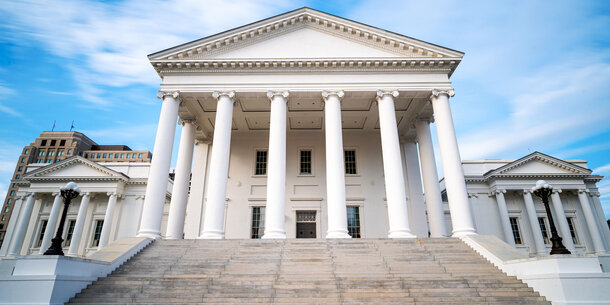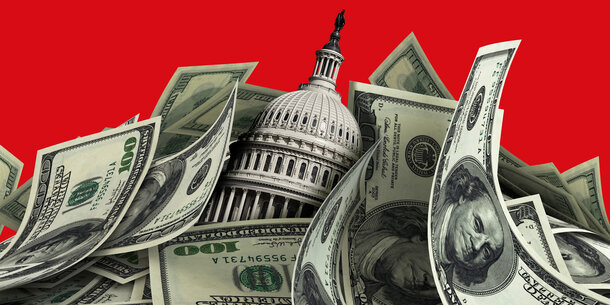AI in DC: Industry Spending on Federal Policy
By Anna Massoglia
Sam Altman, the OpenAI chief who oversaw the launch of ChatGPT, was once a registered Democrat who primarily donated to liberal or progressive candidates. He gave six-figure sums to support Joe Biden’s 2020 presidential bid and Democrats in the Senate.
That was before the second Trump administration brought new fights over AI regulation to Washington. Earlier this year, Republicans bundled a moratorium on AI regulation into the Trump-backed budget bill. It would have blocked state legislation aimed at preventing the use of AI to discriminate, protecting minors from manipulation, or requiring transparency for consumers, to name just a few examples. It would have been a massive victory for the AI industry. Although the proposal didn’t pass, it provides an interesting window into the shifting financial allegiances of Sam Altman and his peers.
In October, a month before the 2024 election, Altman gave $3,300 each to Sens. Ted Cruz (R-TX) and Marsha Blackburn (R-TN), the maximum allowed under federal law at the time. Both senators went on to become key players in the fight over whether to include a federal ban on state-based AI regulations in the Trump-backed budget reconciliation bill.
When Trump defeated Kamala Harris, Altman cultivated a relationship with the new president as well. Altman gave Trump’s inaugural fund $1 million, Altman’s biggest-ever direct political contribution. A week before Trump’s inauguration, Tools for Humanity, another company cofounded by Altman, contributed $5 million to MAGA Inc., the main pro-Trump super PAC. It’s the only contribution the company has ever disclosed in federal campaign finance filings.
This year, Altman gave the maximum legal contribution to several Republican members of Congress who have each furthered the policy interests of the AI industry in different ways. That includes Sen. Thom Tillis (R-NC), the sole senator who did not vote to remove the moratorium on AI regulation from the budget reconciliation bill, and House Energy and Commerce Committee Chair Brett Guthrie (R-KY), who backed the moratorium and pledged to continue efforts to preempt state AI law. Altman also contributed the maximum legal amount to Rep. Darin LaHood (R-IL), who has championed policies cracking down on Chinese companies that compete with American AI firms, and Sen. Mike Rounds (R-SD), a member of the Senate’s bipartisan AI working group.
Altman has continued to court some Democrats as well. In March, Altman reportedly hosted an AI-focused fundraiser for Sen. Mark Warner of Virginia, who has introduced legislation to regulate AI but also promoted investment in the industry.
The shift in Altman’s giving habits reflects a broader AI industry trend of ramping up spending on political influence. Google contributed $1 million to the Trump inauguration while calling for exemptions allowing the company to train AI models using copyrighted material. Amazon, Meta, and Nvidia also gave $1 million each, while Microsoft chipped in $750,000.
If this trend continues, the industry’s political spending in the 2026 election cycle could reach new levels.
AI industry insiders recently announced the launch of Leading the Future, a network of super PACs and 501(c)(4) nonprofits that anticipates raising $100 million from AI executives and investors. Meta has separately pledged tens of millions of dollars each to fund two other groups, one focusing on California and another on state candidates across the country.
Leading the Future will be funded by major figures in AI. Venture capitalists Marc Andreessen and Ben Horowitz, whose investment firm has invested in multiple AI and crypto startups, pledged $50 million. Last cycle, Andreessen and Horowitz gave $70 million to crypto super PACs like Fairshake and $7 million to a pro-Trump group, Right for America.
Greg Brockman, who cofounded and leads OpenAI, and his wife, Anna Brockman, committed to contributing another $50 million to the new AI political venture. The couple doesn’t have a history of political giving anywhere near this scale.
Other known supporters of Leading the Future include venture capitalist Ron Conway, known as the “Godfather of Silicon Valley,” and Palantir cofounder Joe Lonsdale, who now manages venture capital firm 8VC. While Conway is a Democratic donor who supported Harris in the 2024 election, Lonsdale has a history of contributing to groups supporting Republicans, including $1 million to Elon Musk’s America PAC, which supported Trump’s 2024 bid.
The AI industry has sunk hefty sums into lobbying as well. OpenAI alone spent $1.8 million on federal lobbying in 2024 and went on a lobbyist hiring spree after Trump’s election. The company spent more than $1.7 million on federal lobbying in the first half of 2025, putting it on track for a record year.
The AI industry’s growing investments in federal policy are already paying dividends. Trump kicked off his Inauguration Day by rescinding Biden’s regulations designed to prevent AI from causing harm. In July, Trump filled the void with “America’s AI Action Plan,” a roadmap outlining more than 90 federal actions largely dedicated to helping the American AI industry through deregulation, infrastructure investment, and international dominance. Much of the plan echoes talking points pushed by AI industry lobbyists while sidestepping more controversial issues, such as AI safety and environmental costs.
The fight over AI policy is far from over. Those who backed the moratorium on AI regulation in the budget bill have already signaled plans for a new iteration, and there will no doubt be more policy debates to come.





